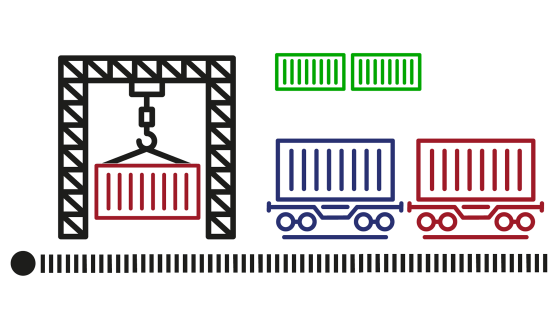Management and Logistics

Focus and concept of our research at the Chair of Management and Logistics
The research of the Chair of Management and Logistics is focused on the application-oriented planning, control, and analysis of logistics and transport services. Against the background of the social goal of efficient and at the same time environmentally-friendly freight transport, our research in the two research areas "Planning" and "Analysis" aims to contribute to the efficient design as well as the modal shift, avoidance, and reduction of freight transport. In particular, we focus on intermodal transport chains, urban logistics systems, and cross-actor transport platforms.

The focus of our research is the intermodal transport chain


The research of the Chair of Management and Logistics deals with the application-oriented planning, control and analysis of logistics and transportation services. Against the background of the social goal of efficient and environmentally friendly freight transportation, our research aims to contribute to the efficient design of logistics and transportation systems as well as the avoidance, shifting and reduction of freight traffic. The focus here is particularly on intermodal transport chains and cross-actor transport platforms.
Characteristic for our research concept at the TU Darmstadt is the focus on method-based and instrumentally-applicable support of the planning as well as analysis of transportation and logistics systems.
Our research topics are methodologically based on modeling, simulation & optimization. By combining optimization methods and simulation experiments, specific challenges and uncertainties in the planning and analysis of transportation and logistics systems can be instrumentally considered inapplicable solution methods. Besides, we use qualitative-empirical surveys and interview studies, process modeling, and data analysis as research methods.
With the thematic emphasis on intermodal transportation systems – with continental and maritime transportation networks, urban transportation and logistics systems as well as cross-actor digital transportation platforms – we see the opportunity to adequately combine the specific technological strengths of individual modes of transport and corresponding container and transshipment technologies with the aid of methodological and instrumental support for planning and analysis. What can be adequate in this context can be determined using modeling, simulation, and optimization.
With our research, we pursue the goal of making a relevant research contribution to the planning and analysis of intermodal transportation networks – especially with regard to coping with the predicted increase in transportation demand. Specifically, we want to investigate how intermodal transportation systems can be designed from a business perspective regarding the realization of productivity and efficiency increases. Furthermore, we also take into account the view of society as a whole concerning the achievement of climate goals and the reduction of other external effects (which can be realized via traffic avoidance through, e.g., reduction of empty runs, traffic shift to environmentally friendly modes of transport and traffic reduction through e.g. higher capacity utilization).
Our research addresses both perspectives as follows:
- The planning and management of logistics and transportation services plays a decisive role in the reduction and relocation of freight traffic. The “Planning” focus area is dedicated to the strategic, tactical and operational planning of intermodal transport chains and urban logistics systems. In order to ensure cost-efficient and reliable logistics and transport services, the focus area develops solutions for transport network and location planning, capacity planning and route planning with the help of simulation and optimization models. The consideration of uncertain parameters (transport demand, times and capacities) plays an important role here.
- The thematic focus analysis is particularly set on the analysis of intermodal transport chains and cross-actor transport platforms. In this context, our research aims to analyze the complex interactions of the multitude of operational and regulatory factors and to derive recommendations for action and application-oriented solutions. Exemplary research questions include the analysis of the effects of transport policy measures on urban logistics systems, decision-making behavior in the choice of means of transport in seaport-hinterland traffic and the influence of cross-company information systems in transport order processing.
As a result, we would like our research to provide scientifically sound and practically relevant findings to improve intermodal transport systems – especially at the interfaces between the road/rail transport modes.




